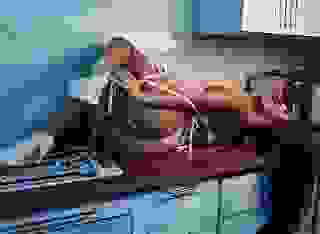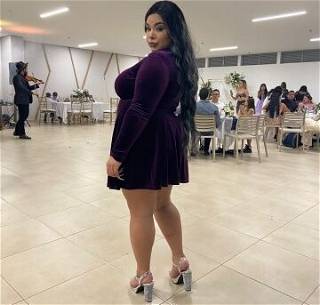- Erotic Horror
- Leaves
Note: You can change font size, font face, and turn on dark mode by clicking the "A" icon tab in the Story Info Box.
You can temporarily switch back to a Classic Literotica® experience during our ongoing public Beta testing. Please consider leaving feedback on issues you experience or suggest improvements.
Click hereHe was a big guy but quiet, and when things didn't work out for him he liked to be alone, so he was alone a lot. That didn't bother him much, because he didn't feel like he had much to say to other people anyhow, at least, not about the things they cared about. He was a former football player and looked it, and so people were surprised at how introspective he was. They didn't know what to make of him.
He was given to thinking about big things, about life and death and what was possible or not. He loved things that were irrational or that baffled him, and he sought them out. He believed that the human mind was very small compared to what was out there, and that you had to leave yourself open to things you didn't understand, because when the truth came, it wouldn't come as a result of logic or the things he knew, but from somewhere else, totally unexpected, wearing a face he'd never seen before and possibly wouldn't even recognize.
He was pretty sure that thinking about the kinds of things he thought about was the most important thing you could do with your life, but he was aware that all this thinking didn't make him very popular. That did bother him, because while he didn't mind being alone, he didn't like being lonely. He wasn't sure whether the kinds of things he thought about prevented him from having friends, or whether the fact that he had no friends made him think about the kinds of things he did. He had a good job that paid him very well for very little work, and one in which people left him alone. He wondered whether that was good or not too.
There was a golf course not far from his new apartment, and since he liked to walk, he often went there at night, walking on the grassy verge because there were no sidewalks where he lived: everyone drove cars. The golf course was protected by a chain link fence, but in places the fence was old and sagging or just fallen down, especially by the little creek that ran as a little water hazard through the manicured fairways. There was a big patch down by the fence near the ninth tee that was too inaccessible to mow or spray or make out in, and over the years had been allowed to revert to whatever nature would have it be. Willows hung over the little creek that here was wild and swampy, and poplars stood guard behind, screening it from the golf course proper. There were maples and dogwood, hackberry and fir and bushes whose name he didn't know, sloping down to an open spot before the stream where weeds and wildflowers grew in the spring.
He never went there, because that would require wading in the creek, but he liked to stand on the little concrete bridge nearby and just look at the patch and let his mind go blank. Sometimes he would play games, like squinting his eyes to make everything blur, or making a tiny little hole by putting his thumb against the crook of the top joint of his index finger and looking at things through that, or other foolishness, but in the end he found that just looking at the patch was very pleasing to him and restful. The human eye seems to take pleasure in things that are green and shadowy and overwritten with nature's hieroglyphics, and that was the patch. He hadn't been to church since he was a child, but standing on the bridge was like standing in front of something sacred. There was some sort of infinity in there, a wild place where no human hand could reach.
He began coming down here with nature books, and learned the names of the trees and weeds, and even some of the bushes, plants he usually wouldn't even notice. In the summer there was the green scrim of tall grasses and the soothing shadows of rustling leaves, the sounds of insects and maybe frogs by the edge of the water. In winter, black and sepia bleakness and stark steel-pen angularity of the dead weeds and naked trees, black twigs making a mosaic of the gray and lowering sky.
No matter what time of year it was, though, what he saw and felt there pleased him and drew him back, and he became very attached to the patch. The trees were like people—the melodramatic willows, the staid and conservative poplars, the quiet but good-natured firs that seemed to keep up the other's spirits in the winter. He believed in nature like he believed in God, both of which seemed to have fallen out of favor these days so that the closest he came to either was on TV, and so it was a great thrill for him to realize that the patch was nature too, unruled, unwatched, uncared for, his own bit of the unknown. Barely an acre, but what went on in there was no man's business and hadn't been for years.
That was important to him, because he believed it was necessary to live near a frontier or gateway, either a river or ocean or a bit of wilderness—or even, as a last resort, a highway or railroad if nothing else was available—some way for the unknown to reach into your life and make its presence known. He believed you had to make yourself available to the miraculous, which he was sure was out there. The patch wasn't much, but it was all he had.
He lived where the change of seasons was fairly dramatic, and he savored each one. Spring was especially good, and this year he rushed into it impatiently, barely waiting for the first night warm enough to go out walking, where he could hear the melt water running beneath the dirty snow, and the air was as cold and raw as the earth it blew over. He went out to the bridge where the weather could find him and stared at the bare trees and dead grass of the patch and let the raw wind scour his face till his eyes watered. The wind was full of life, and he could feel stirring in the soil as well, and even in the urgent icy water of the little creek, wild and full of itself with the spring runoff like a drunken adolescent.
He knew that the early spring flowers—the daffodils, the crocuses, the narcissus and snow drops—would all bloom on the same day, each after its own kind. It didn't matter if it was down here at the patch, or in a city back yard thirty miles away. On a certain night, each species would bloom all at once, as if they were all wired together to one grand switch. No one knew how it happened and no one could explain it, but it proved to him that there were ways of communicating that people didn't know about and couldn't even imagine. That thought pleased him. He liked to think that there were things going on that no one understood, and things being said that no human ever heard—many, many things, he suspected, more than most people dreamed.
And on that raw and windy March night he could feel one of them, even if he couldn't understand it. He could feel spring pushing against him with soft and insistent force—cold still, but the warmth would come. The image he had was of a huge, dark, breast, full of life and promise, and the image made him smile. He could almost hear the scrabble of millions of little feet in the soil and feel the restless coiling of leaves in the bud on the tossing trees, and he could sense some big mystery rubbing up against him like a cat that wanted to follow him home and come inside. He'd felt that cat before. He'd felt it before and had always looked for the handle that would open the door to let it in, but he'd never found it.
He wouldn't find it now, either, but he realized that the Patch was giving him a taste of it, a peek, letting him in on a secret, and right then and there, in the raw, misty night, he slapped his hand down on the bridge and laughed for joy—laughed like a loon and didn't care who heard him. There was mystery in the world, and he loved it.
After that it was his place, his sacred grove. No one used the bridge, because no one walked anywhere anymore, and he had it all to himself. He came there and stared at the Patch and let himself go, let it flow through his senses and speak to his body directly, telling him things he couldn't hear and washing himself clean on the inside, looking at the weeds and trees and that shy little brook. He saw the spring come, the browns give way to green, the fresh soft greens hardening and becoming dark and serious.
On a day in June he met a girl walking towards him across the bridge, out of the golf course, out of the Patch. He said hello and she smiled. She was there again the next night, and he said hello again and again she smiled.
On the third night he asked her where she was coming from, if he might be so bold, and she told him she was coming from that little patch of woods, that berries grew in there and along the edges of the golf course, and she showed him a little plastic bag she had in her purse, containing dark blue berries with their purple juice. They talked—she was surprisingly easy to talk to—and she promised to bring him blueberry muffins if he was there the next night.
Her name was April and she lived nearby, in a big, raw-looking apartment building. The halls of the building smelled like wet laundry, a fact that stopped bothering him when he would go there to pick her up. She lived alone, and was like no one he'd ever met.
It wasn't just her appearance, though she was lovely and seemed to grow lovelier every time he saw her. Rather it was the way she seemed to radiate calm and tenderness and patient understanding. She never needed for him to say anything, and so he could talk to her, and everything he said was like a gift. Harold—that was his name—began to flower. In her presence, he was something new and precious and exciting, and being this to someone quite took his breath away.
She had no special preconceptions or pretensions of her own, and so she didn't think his thoughts were silly. She wondered about the same things he did, and she also thought that thinking about them was probably the most important thing a person could do with their life. In her presence, thoughts and pieces of himself that seemed old and worn-out became shiny and new, and she took them and turned them over in her hands, seeing things he'd never seen in them, and gave them back to him shined and polished and gleaming, things he could now be proud of and that astonished him himself.
She was perfect, despite her little quirks. She didn't like movies or the noise of clubs, places he tried to impress her with before he understood her. Museums were okay, and classical music, and quiet, but she didn't like crowds and money didn't impress her. Sometimes he'd take her out to dinner, and then they'd drive out to the Planetarium on the lake, from where they could see the lights of the city. It was like looking at a bigger Patch, bright and manmade, but the idea was the same. He'd never liked the city before, but he realized now that had been because he was envious. With April, he wasn't envious of anyone anymore.
Still, their favorite evening was to walk over to the golf course and lean on the bridge. It was there that he finally kissed her, when he could hold out no more. He'd agonized over it for days, over how he'd do it, what he'd say, but in the end it was as easy and natural as a leaf falling from a tree. He just turned to her and there she was for him, and he could almost hear the trees applauding them as they stood there lost in each other's arms.
She kissed like no one he had ever met, her mouth full of promise but expectant, waiting for him. He had an image of a still pool waiting for a rock to be thrown into it, the rock sinking into the cool and mysterious depths as the ripples spread out to the shore, the surface breaking into coruscations of brilliant light.
That was the first night they made love, back at his apartment. She was naturally modest so he thought she was shy, but he was wrong. She responded to his kisses in a way he'd never imagined a woman would, as if each one was different and precious, and she embraced him with a clinging softness that made him weak. It seemed like everywhere he touched her was the right spot, and everything he did to her made her tremble. They kissed naked on his bed, and she was exquisite. He would have been happy to just lie there and hold her and kiss, but now she was insistent.
He got up on his knees between her thighs, and he felt like he stood before the door to something holy, and what is holiness but the sense of something bigger than ourselves, something geared to the mysterious wheels that drive the universe? That's how Harold felt as he knelt between her thighs, as if all the mystery and beauty of the world were right there before him.
And it was holy. It made his previous sexual experiences feel like games of spin the bottle, like grammar-school kisses of tightly-clamped lips pressed against each other, devoid of all emotion. April was open and wet, hot and supple, yielding even as she fucked him back with a woman's strength and slow, insistent hunger. He made him feel what it was to be a man. She took his breath away.
She opened for him and made a place for him in her body, a place he knew that no one else had ever been or would ever go, a place that seemed to already be a part of her, as if she'd been born for him. For the first time he knew what it was to make love and not just fuck, to share his flesh with another and be inside her, a part of her; and not just his body, but his mind and his emotions and his very soul as well: in her, of her, one with her. That's what it was like—like he was her as well as himself, with no walls between them, nothing to separate them, and he felt himself fucking her and being fucked at the same time, kissing his own lips and groaning in his own ear.
He felt it all flooding out of him—all the loneliness and anguish and fear, all the misery and despair in his life. It all gathered into one burning knot, one aching pressure that finally exploded out of him and into her body as she clung to him and cried out in joy and triumph, taking what he gave her and turning it into pleasure of her own. He hung arched above her, thrust as deep as he could go as it boiled out of him and April arched back in desperate acceptance, clawing the sheets as her own ecstasy broke over her in an obliterating wave, taking them both to a place where they were together in their joy, with no bodies at all to get in the way.
Their sex was the beginning of his joy, where he found a peace and fulfillment that was as close to an answer for those things he always thought about as he was ever likely to get. There was mystery in their sex, and the feeling of rubbing up against the great unknown, something bigger than him and bigger than April and bigger than both of them combined. There was something of that cat again, something of that same sense of mysteries about to be revealed, but farther than that he couldn't go.
His happiness was noticed. It attracted people. They flocked around him, not knowing what it was but wanting some of it for themselves, or perhaps just curious or even resentful, and soon he had friends, or what passed for friends—people who were happy to talk to him, if not always happy to listen. Having friends was a new experience for him, and exciting. They were always moving about, and that movement felt like progress, like he was going somewhere.
He and April were invited out, and that's when the trouble started. She was reluctant to go, and took forever to get ready. And it wasn't just a matter of finding the right thing to wear or put on her face, it was more that she just couldn't get emotionally ready, or physically.
It was a joke at first, but then it became troublesome. One night he stepped into the bathroom to bring her a towel as she showered, and playfully pulled the shower door open, and for a moment he couldn't see her face. It must have been her tangled hair, but for a moment all he could see what hair—strands of hair like bundles twigs, with no face behind them. April screamed in alarm and turned away, and he staggered back, pretending to laugh. He'd been looking at her breasts. It was only later that he realized he hadn't seen her face, and all night it bothered him, like a barely remembered dream. He began noticing all the make-up she wore when they went out with his friends. She never wore make-up at home.
He liked his friends. He liked their excitements and their entertainments: clubs, sporting events. Especially the sporting events. He liked all the focus and intensity, the rules, all that energy and effort expended on getting a ball across a field. He began to care and care passionately about who won and last, as if the games weren't entertainment at all, but something serious and important.
April hated the games, just detested them. She didn't like the crowds and the emotionalism of the fans, and winning and losing meant nothing to her. She asked him one night why, if it were so important that they get the ball across the goal, they didn't just invent a machine to do it and be done with all the sweating and shoving. It took him some time to realize that she was serious.
He learned to play golf, and played a few times on the course that bordered the Patch. The first time he tried to pick it out from the ninth tee, but from there, the rough all looked the same. After that, he forgot about it. He did well for a beginner. He rode in a cart.
He grew comfortable in love and took it for granted. He and April stopped walking out to the Patch to just stand on the bridge and gaze. It seemed silly now, quaint and slightly embarrassing, and he lived in dread that April would mention it in public, in front of his new friends. He couldn't imagine what he had seen there.
He loved the flash and color of his new life. He liked acceleration—physical or emotional. With his confidence and money and with April staying home so much, he became a very attractive target. There were women who were attracted to his happiness and wondered whether it was genuine and whether they could have some of it by sleeping with him, or, failing that, whether they could ruin it for him. They could. The girls who bedded Harold thought she should know about it and so they made sure she found out. She never reproached him about it, but she began to get ill quite a bit. He hardly noticed.
He hardly noticed anything anymore, not till he came home one bright autumn afternoon and she was gone.
There was no note, nothing like that, just a profound emptiness when he entered the apartment, a stillness of air and a melancholy slant to the afternoon light falling on the bedroom floor.
It the end of October, and fall had turned the trees to harlequins outside his apartment windows. He hadn't noticed that either. Fall is the pivot of the year, his favorite season, and one he'd looked forward to sharing with April. And now she was gone. What had he done?
Her apartment was gone, sublet months ago. She didn't answer her phone. For the first time in weeks, he walked out, heading for the patch, not knowing where else to look. Now he saw as he walked. Now he remembered. The colors of the leaves reminded him of his old box of watercolors, the little gem-like pallets named Indian Red, Burnt Sienna, Alizarin Crimson, Ochre, Gall, beautiful and sad. The fallen leaves crunching under his feet like delicate bones, and he stopped and picked one up. Twisted, red and brown, exquisite, and, like a snowflake, different from all the others. The world was profligate with beauty if only you stopped to look, and if only you had someone to share it with.
She was not at the patch and he stood on the bridge letting the colors soak into his eyes and into his soul, as if weeping in reverse, missing April like he hadn't missed her in weeks, as he'd never missed anything in his entire life. The trees in the patch were silent and respectful as befitting those who were about to die. It was Halloween, October 31st, and they were waiting for this one last riotous celebration before the November darkness set it. It was a time to let loose, a day without a tomorrow, a time without consequences.








